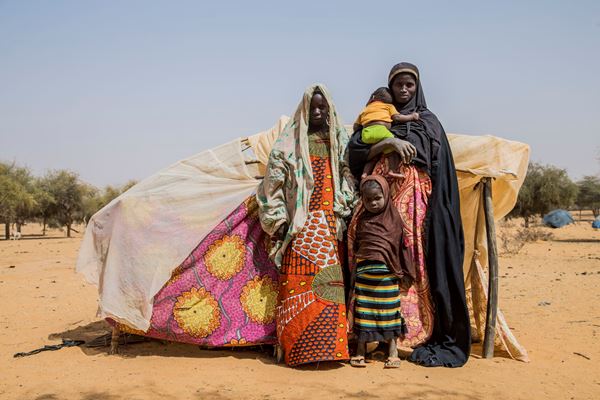
By Mohammed Momoh
Some countries in West Africa are facing a twin problem of harsh environment and insecurity, leaping and wobbling with the brand name, Sahel as citizens bear the brunt.
The Sahel region Niger, Burkina Faso, Mauritania, and Mali and northern part of Nigeria, have been going through rough times with population ravaged by poverty induced by hazardous weather and internal crisis as well as insecurity.
The climate is arid and hot, with strong seasonal variations in rainfall and temperature. Sahel region has a landmass of over 3.05 million square metres and a population of more than 84 million of which 80 percent are living on less than $2 a day.
Aside the natural problem of harsh weather, the threat of violent extremism in the Sahel has now become one of the biggest challenges for countries in West Africa, the Economic Community of West African States (ECOWAS), has re-echoed.
Sahelian countries are also experiencing unprecedented levels of organized violence particularly Mali, Burkina Faso, and Nigeria both of which registered the conflict-related death tolls in years. In Nigeria, for instance, the menace of Boko Haram terrorists in northeast since 2009 has cost the country more than 36,000 lives and rendered some millions homeless.
With the downturn in economies of the Sahel region, poverty is staring and attracting global attention and generating sympathy for the sake of humanity.
The U.S. government on September 25, 2020 in Abuja announced it had provided nearly $152 million to countries of the Sahel region as humanitarian assistance.
U.S Secretary of States Michael Pompeo unveiled the assistance in a statement released to the African Regional Media Hub and says the country remains the largest single donor of humanitarian assistance to Sahel region.
Pompeo said the funding includes nearly $67 million from the State Department’s Bureau of Population, Refugees, and Migration as well as more than $85 million from the U.S. Agency for International Development’s Bureau of Humanitarian Assistance.
“Our assistance will provide critical protection, livelihoods, shelter, essential healthcare, emergency food assistance, safe drinking water, sanitation, and hygiene services for refugees, internally displaced people, and vulnerable host communities,’’ he said.
The United Nations on October 20, 2020 at a donor conference for Sahel region countries plagued by violence, poverty and climate change, reported that it is seeking hundreds of millions of dollars.
UN Emergency Aid Chief, Mr Mark Lowcock, said donor countries should also help the region on the southern rim of the Sahara desert because it is a breeding ground for extremists and criminal groups.
Jihadist groups have over the past few years been able to successfully mobilise and radicalise people in the Sahel, a region plagued by systemic, political and socio-economic problems.
These groups are now spreading to the coastal states. Numerous such groups have emerged in recent years, including Ansar Dine, al-Qaeda in the Islamic Maghreb (AQMI) and al-Mourabitoum and Boko Haram.
At the online conference hosted by the government of Denmark, Germany, European Union and the United Nations, Lowcock warned: “If things deteriorate in an alarming way there will be consequences and implications for everybody.’’
He explained that climate change is also stoking conflict, as farmers and herders fight over dwindling fertile land, explaining that the number of people who have been uprooted from their homes in the region has increased more than 20 fold to 1.6 million in 2020 alone.
The UN needs $1.4 billion to provide urgent humanitarian aid to more than 13 million people in the three central Sahel countries this year, but so far only 39 per cent of that sum has been funded.
Mr Ibrahim Thiaw, Executive Secretary of United Nations Convention to Combat Desertification (UNCCD), also reported that “every day, you have more conflicts among people that are competing for access to land and water; the root cause of the competition is access to natural resources’’.
As the region battles insecurity in the region takes turns, depending on the country, Nigeria has set up Troops of Operation Sahel Sanity in addition to the Multinational Joint Task Force (MNJTF) mandated to address the Boko Haram problem in the Lake Chad Basin with troops from Benin, Cameroon, Chad, Nigeria and Niger.
In addition, there is a Joint Force of the Group of Five of the Sahel (G5 Sahel), comprising Chad, Mali, Mauritania, Niger and Burkina Faso, also meant to address violent extremism concerns in the Sahel.
The Acting Director, Nigeria Defence Media Operations, Brig Gen Benard Onyeuko, said the troops were recording more successes against bandits and other criminal elements in recent time.
ECOWAS along with regional and international organizations have reiterated their commitment to addressing challenges such as terrorism, climate change, poverty, food insecurity and illicit trafficking in the Sahel region by harmonizing their approaches and improving coordination in the implementation of their strategies.
This was the major resolution of a high level meeting of regional organizations on the Sahel which held in Abuja in September. The meeting was organized in collaboration with the African Union (AU) and the United Nations Office for West Africa and the Sahel (UNOWAS).
The meeting also resolved to push policies to facilitate the mobilization of resources from regional and international partners to support joint programmes and projects in the region.
The ECOWAS Sahel Strategy, an action plan of 31 priority projects, opened its wallet for $4.75 billion which it hopes get to help create stability in the region.
The Commissioner, the Special Representative of the Secretary General for West Africa and Sahel, Dr Mohamed Ibn Chambas, stated that only by harmonizing the partnership between the various organizations, building synergy and developing joint interventions can the Sahel region attain lasting peace, security and sustainable development.
Chambas further stressed that the violence related to pastoralism is concerning, and can be addressed through provision of water and making the geographic scope wet and friendly to stop nomadic system.
Mr Habib Adams, a Consultant in Peace and Conflict Resolution, said the major challenge for ECOWAS in the operations of ad hoc structures in the region is the overlap of troop contributions by member states.
Noting that Chad and Niger contribute troops to both the MNJTF and G5 Sahel, and to MINUSMA, he said that in a region where national military capacities are limited, the inability to properly coordinate existing efforts at the ECOWAS level can lead to overstretch and has implications for commitments to emerging regional arrangements, such as the ECOWAS Standby Force.
ECOWAS’s inability to lead important responses such as the fight against Boko Haram also has implications for the perfecting of regional mechanisms, the consolidation of regional norms and the projection of relevance, he said.
In addition to the main climate and security problems, President Nana Addo Dankwa Akufo-Addo, Chairman of the Authority of Heads of State and Government of the ECOWAS, identified political instability as another cankerworm, making reference to the recent coup in Mali.
Akufo-Addo, who paid a working visit to the ECOWAS Commission Headquarters in Abuja on September 21, 2020, said: “The challenges, in these critical regional spheres, such as security, climate, economy, trade, currency and health, must be addressed in a spirit of genuine co-operation and solidarity, if we are to succeed in overcoming them, which we can.’’











